英国的研发支出对于会计选择的影响因素和价值相关性[外文翻译]
研发支出影响因素文献综述

研发支出影响因素文献综述研发支出是指企业为了开发新产品、改进现有产品、提高生产力和技术水平而进行的支出。
研发支出对企业的发展至关重要,可以帮助企业提高竞争力,创造更多的价值。
研发支出影响因素很多,包括企业规模、技术能力、市场需求、政策环境等。
本文将从不同角度分析研发支出的影响因素,并综述相关文献,以期为今后的研究和实践提供一定的参考价值。
企业规模是影响研发支出的重要因素之一。
大型企业通常拥有更多的资金和人力资源,可以更好地支持研发活动。
研究表明,企业规模与研发支出呈正相关关系,即规模越大的企业通常会有更高的研发支出。
一项研究发现,美国500强企业中的大型企业在研发支出上的投入明显高于中小型企业。
在制定政策或进行研发投资时,政府和企业应考虑到企业规模对研发支出的影响。
技术能力也是影响研发支出的重要因素。
具有较高技术能力的企业通常更愿意进行研发活动,因为他们具备更好的创新能力和市场竞争力。
一些研究表明,技术创新水平较高的企业往往会有更高的研发支出。
一项研究发现,在中国,高技术企业的研发支出占营业总收入的比重远高于传统制造业企业。
提升企业的技术能力,有助于增加研发支出,进而促进企业的创新和发展。
市场需求也是影响研发支出的重要因素之一。
企业通常会根据市场需求来确定研发方向和投入规模。
如果市场需求旺盛,企业往往会增加研发支出,以满足市场的需求。
相反,如果市场需求不足,企业可能会减少研发支出,以降低成本。
市场需求的变化会直接影响企业的研发支出决策。
一些研究表明,市场需求的变化会显著影响企业的研发支出水平。
一项研究发现,中国制造业企业的研发支出与市场需求之间存在显著的正向关系。
政策环境也是影响研发支出的重要因素之一。
政府的相关政策和扶持措施会直接影响企业的研发投入。
一些研究表明,政府的研发支出补贴政策可以显著促进企业的研发活动。
中国政府对高新技术企业实施的税收优惠政策,大大降低了企业的研发成本,推动了研发支出的增加。
英国研发支出的会计处理及其启示

英国研发支出的会计处理及其启示
吴春国
【期刊名称】《四川会计》
【年(卷),期】2003(000)005
【总页数】2页(P50-51)
【作者】吴春国
【作者单位】厦门大学
【正文语种】中文
【中图分类】F275
【相关文献】
1.企业研发支出会计处理探讨 [J], 李晓妍
2.英国研发支出税收激励计划及对我国的启示 [J], 杨博;薛薇
3.医药企业研发支出的会计处理研究 [J], 魏宇君;夏雨超
4.医药企业IPO前后研发支出会计处理措施探究 [J], 周立明
5.医药企业IPO前后研发支出会计处理措施探究 [J], 周立明
因版权原因,仅展示原文概要,查看原文内容请购买。
研发支出会计政策选择文献综述
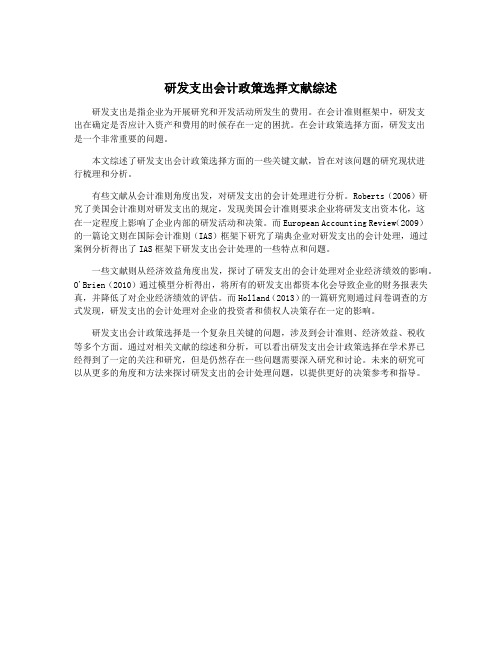
研发支出会计政策选择文献综述
研发支出是指企业为开展研究和开发活动所发生的费用。
在会计准则框架中,研发支
出在确定是否应计入资产和费用的时候存在一定的困扰。
在会计政策选择方面,研发支出
是一个非常重要的问题。
本文综述了研发支出会计政策选择方面的一些关键文献,旨在对该问题的研究现状进
行梳理和分析。
有些文献从会计准则角度出发,对研发支出的会计处理进行分析。
Roberts(2006)研究了美国会计准则对研发支出的规定,发现美国会计准则要求企业将研发支出资本化,这
在一定程度上影响了企业内部的研发活动和决策。
而European Accounting Review(2009)的一篇论文则在国际会计准则(IAS)框架下研究了瑞典企业对研发支出的会计处理,通过案例分析得出了IAS框架下研发支出会计处理的一些特点和问题。
一些文献则从经济效益角度出发,探讨了研发支出的会计处理对企业经济绩效的影响。
O'Brien(2010)通过模型分析得出,将所有的研发支出都资本化会导致企业的财务报表失真,并降低了对企业经济绩效的评估。
而Holland(2013)的一篇研究则通过问卷调查的方式发现,研发支出的会计处理对企业的投资者和债权人决策存在一定的影响。
研发支出会计政策选择是一个复杂且关键的问题,涉及到会计准则、经济效益、税收
等多个方面。
通过对相关文献的综述和分析,可以看出研发支出会计政策选择在学术界已
经得到了一定的关注和研究,但是仍然存在一些问题需要深入研究和讨论。
未来的研究可
以从更多的角度和方法来探讨研发支出的会计处理问题,以提供更好的决策参考和指导。
研发支出对财务绩效的影响研究综述

研发支出对财务绩效的影响研究综述研发支出是企业为了开发新产品、改良现有产品或应对市场竞争而进行的投资。
研发支出对企业的财务绩效有着重要的影响。
本文将对研发支出对财务绩效的影响进行综述。
研发支出能够促进企业的创新能力和技术进步,从而提高企业的市场竞争力。
研发支出可能导致新产品的开发和改良,从而增加企业的产品线和销售额。
研发支出可以提高企业的技术水平和生产效率,从而降低生产成本。
这些创新能力和技术进步能够帮助企业在市场上取得更好的业绩,提高企业的市场份额和利润。
研发支出也能够影响企业的财务风险。
研发支出通常与投资风险高度相关,因为研发项目的成功与否不确定。
一些研发项目可能失败或无法达到预期的商业价值,从而导致企业的损失。
成功的研发项目可能会带来巨大的商业价值,产生高额的回报。
企业在进行研发支出时需要权衡风险与回报,并进行适当的风险管理。
研发支出对财务绩效的影响取决于企业在研发活动中的投入和管理。
研发支出还可以影响企业的资本结构和盈利能力。
研发支出通常需要大量的资金投入,尤其是对于高科技行业和创新型企业而言。
这可能增加企业的债务负担和股权融资需求。
成功的研发项目可能会带来巨大的商业价值和利润,从而改善企业的盈利能力和财务状况。
企业需要在进行研发支出时充分评估资本结构和盈利能力的风险和机会。
研发支出对企业的长期发展和可持续竞争优势至关重要。
长期来看,研发支出可以提高企业的技术积累和创新能力,从而使企业保持领先地位并适应市场变化。
研发支出也可以帮助企业建立起知识产权和技术壁垒,保护企业的创新成果和市场地位。
企业需要在研发支出上进行长期规划和投资,以保持和增强竞争优势。
英国的研发支出对于会计选择的影响因素和价值相关性[外文翻译]
![英国的研发支出对于会计选择的影响因素和价值相关性[外文翻译]](https://img.taocdn.com/s3/m/ac7b4da6ccbff121dc368365.png)
外文翻译The Determinants and Value Relevance of the Choice of Accounting for Research and Development Expenditures in the United Kingdom Material Source: London Business School Author:Dennis R. OswaldAbstractThis paper investigates the determinants and value relevance implications of the accounting method choice for development expenditures for firms with research and development (R&D) programs in the United Kingdom (UK). Using a sample of 1,780 UK firm-year observations over 1993-1997, of which I classify 231 (1,549) firm year observations as Capitalizers (Expensers), I find that the decision to expense versus capitalize is influenced by firm size, the intensity of the firm's R&D programs, and whether the firm is in a steady-state with respect to its R&D programs. Results of value relevance tests indicate that Expensers have little to gain, if anything, in terms of value relevance from adjusting their reported earnings and book value of equity to reflect as-if capitalized numbers. For the Capitalizers, the value relevance of as-if-expensed earnings and book value of equity is not substantially lower than the value relevance of their reported earnings and book value of equity Additional analysis indicates that the steady-state status and R&D intensity of a firm's R&D programs may marginally influence the value relevance of their financial information. These results are in contrast to those in US studies that find that capitalization of R&D expenditures greatly enhances the value relevance of firms' financial statements.Key Words: Research and Development, Accounting choice, Value relevanceIntroductionThis paper investigates the determinants and value relevance implications of the accounting method choice for development expenditures for firms with research and development (R&D) programs in the United Kingdom (UK). Under UK GAAP certain development expenditures may be either capitalized or expensed, with the choice left to the discretion of management. Using the reported disclosures of UK firms (including their capitalization and amortization schedules), I examine two questions related to the expensing versus capitalizing decision: (1) What factorsdistinguish expensing firms from capitalizing firms?; and (2) Conditional on the choice to expense or to capitalize, does the accounting treatment of development expenditures affect the value relevance of these firms’ financial statement information, as captured by the contemporaneous association between security prices and earnings and book value of equity?UK GAAP permits, but does not require, the capitalization and subsequent amortization of development expenditures if five conditions are met: (1) There is a clearly defined project; (2) The related expenditure is separately identifiable; (3) The outcome of the project is examined for its technical feasibility and its ultimate commercial viability considered in the light of factors such as likely market conditions (including competing products), public opinion, and consumer and environmental legislation; (4) The aggregate of deferred development costs, any further development costs, and related production, selling and administrative costs is reasonably expected to be exceeded by related future sales or other revenues; and (5) Adequate resources exist, or are reasonably expected to be available, to enable the project to be completed and to provide any consequential increases in working capital [Statement of Standard Accounting Practice (SSAP) No. 13, 1989]. Throughout this paper, I refer to development expenditures that meet conditions (1) - (5) as qualifying development expenditures. If conditions (1) - (5) are met, UK GAAP does not require capitalization - firms may choose to expense these costs in the period incurred. Thus, my investigations (of both management’s decision to select one accounting method over another and the possible valuation implications of that decision) assume that UK expensing firms meet the conditions to capitalize certain development expenditures and choose not to.My study is related to three areas of research. The first is research on the determinants of choices among generally accepted accounting rules. In particular, the first part of my analysis examines UK firms’elections to capitalize versus expense qualifying development expenditures. The second set of studies to which my paper contributes is research investigating whether and how the choice of accounting method influences the informativeness or value relevance of intangibles. Finally, is research on the value relevance of financial information when it is affected by the accounting treatment for R&D expenditures. My paper adds to the extant literature in two main ways. First, by focusing on the capitalization versus expensing decisions made by a sample of UK firms, I am able to examine the value relevance effects of actual (rather than hypothetical) capitalization and amortizationrules for qualifying development expenditures. Second my analysis of the value relevance of reported and adjusted accounting information for UK firms allows me to explore the association between measures of firm value and financial statement information conditional on a firm’s choice of one accounting treatment over another.My first set of tests examines factors that I hypothesize influence the choice of accounting for development expenditures. Based on prior research, I posit that both an industry-specific factor (product life cycle) and firm-specific factors (profitability, leverage, R&D intensity, R&D steady-state, systematic risk and firm size) influence this choice. Using a sample of 1,780 UK firm-year observations over 1993-1997, of which I classify 231 (1,549) firm-year observations as Capitalizers (Expensers)2, I find that the decision to expense versus capitalize qualifying development expenditures is influenced by firm size (smaller firms are more likely to capitalize), the intensity of the firm's R&D programs (firms with greater R&D intensity are more likely to capitalize), and whether the firm is in a steady-state with respect to its R&D programs (firms not in steady-state are more likely to capitalize).My second set of tests compare the value relevance of both reported earnings and book values of equity versus adjusted values of these variables (where the adjustments restate the reported financial information to the alternative accounting method3). The results indicate that Expensers have little to gain, if anything, in terms of value relevance from adjusting their reported numbers to reflect as-if-capitalized numbers. For the Capitalizers, the value relevance of as-if-expensed earnings and book value of equity is not substantially lower than the value relevance of the reported financial data; the magnitude of any difference in explained variability is small. Additional analyses examine the influence of firms' steady-state status and level of R&D intensity on the value relevance of their earnings and book value of equity. The results indicate that steady-state status and R&D intensity may play a minor role in influencing the value relevance of earnings and book value of equity of firms with R&D programs. Specifically, the explained variation is generally significantly higher under a policy of capitalizing versus a policy of expensing, with the difference being larger for firms either not in steady-state or with high R&D intensity; however the magnitude of the difference remains small.The rest of the paper is organized as follows. The related literature and motivation for this study are provided in section 2. Section 3 develops the hypotheses and research design. The sample and data requirements are discussed in section 4. Section 5 presents the analysis of the determinants of the expense versuscapitalization decision, and Section 6 reports results on the value relevance of earnings and book value of equity under each accounting method. Section 7 summarizes the results and concludes.VII. Summary and ConclusionUsing the reported disclosures relating to development expenditures of 1,780 UK firm-year observations over 1993-1997, I investigate two specific questions relating to the capitalize versus expense decision: (1) What factors distinguish expensing firms from capitalizing firms?; and (2) Conditional on the choice to expense or to capitalize, does the accounting treatment of development expenditures affect the value relevance of these firms' earnings and book value of equity?My first set of tests examines factors that I hypothesize influence the choice of accounting for qualifying development expenditures. Specifically, I use a log it regression of the decision to expense qualifying development expenditures on industry indicator variables (to proxy for product life cycle), profitability, leverage, systematic risk, firm size, R&D intensity and R&D steady-state. The results indicate that larger firms, firms in steady-state and firms with lower R&D intensity are more likely to expense their qualifying development expenditures.My second set of tests compares the value relevance of reported earnings and book value of equity to the value relevance of the adjusted values of these variables (where the adjustments restate earnings and book value of equity to the alternative accounting method). The results conditional on the choice of accounting method for qualifying development expenditures are mixed regarding which method generates the higher value relevant earnings and book value of equity. Specifically, in some instances, adjusted (reported) financial data explain significantly more of the variation in share prices than do reported (adjusted) financial data for the Expensers (Capitalizers); however, the difference in adjusted R2 is small in magnitude. The results of the other tests (i.e., the variance of the log of the ratio of predicted share price to observed share price and the explained variability from the price and return regressions on the R&D components) indicate no difference in value relevance between using reported and adjusted numbers. Finally, the results of additional analyses that examine the influence of steady-state status and R&D intensity of firms' R&D programs are also mixed. In some cases there is limited evidence that for firms not in steady-state or with high R&D intensity the value relevance of their earnings and book value of equity is higher using numbers based on a policy of capitalization versus expensing.译文英国的研发支出对于会计选择的影响因素和价值相关性资料来源: London Business School 作者:Dennis R. Oswald摘要本文探讨了英国的研究与开发支出(R&D)对于公司会计选择的影响因素和价值相关性。
研发支出会计政策选择文献综述

研发支出会计政策选择文献综述近年来,随着全球范围内的经济发展和技术进步,企业扩大研发投入往往是提升自身核心竞争力的必要选择。
对于研发支出的会计政策选择,其涉及到企业财务报告的质量和可比性等方面的问题,因而备受重视。
本文从会计政策选择的角度,对研发支出的会计处理问题进行了综述,并总结了相关研究的主要结论。
研发支出是企业在进行技术创新、研发新产品和服务等过程中产生的支出,其会计处理方式主要有两种:资本化和费用化。
资本化是指将研发支出作为固定资产计入资产负债表,按照折旧或摊销的方式逐年计提相关费用。
这种会计政策可以使得企业短期财务报表利润较低,但长期来看有助于提高企业的净资产和财务健康度。
费用化是指将研发支出作为期间费用计入损益表,即在当期直接减少当期收入,这种做法使得企业短期财务报表利润较高,但长期来看可能会对企业未来的发展产生不利影响。
二、相关研究综述1. 研发支出的资本化与费用化对企业价值的影响Chauvin et al. (2017) 的研究表明,研发支出的资本化会导致企业未来现金流量的稳定性更高,因而有助于提高企业价值。
而费用化则可能会使得企业财务状况更加脆弱,进而对企业市值产生负面影响。
3. 研发支出会计处理的国际差异性Jin et al. (2014) 的研究表明,不同国家会计准则对研发支出的资本化和费用化要求存在差异。
例如,美国的会计准则允许将研发支出资本化,而欧洲的会计准则则鼓励研发支出费用化。
因此,企业在跨国运营时需要考虑不同国际会计准则的影响。
三、结论与建议综合以上研究,研发支出的会计政策选择需要考虑多种因素,如企业的长期战略、财务稳健性和未来现金流量预测等。
建议企业根据自身情况,充分评估资本化和费用化的效果,制定合适的会计政策。
同时,建议各国会计准则制定机构进一步加强国际间的会计准则协调,以降低国际贸易成本和提高跨国企业决策的透明度。
论文翻译-会计信息披露与企业财务属性证据来自英国股市Accounting disclosure...
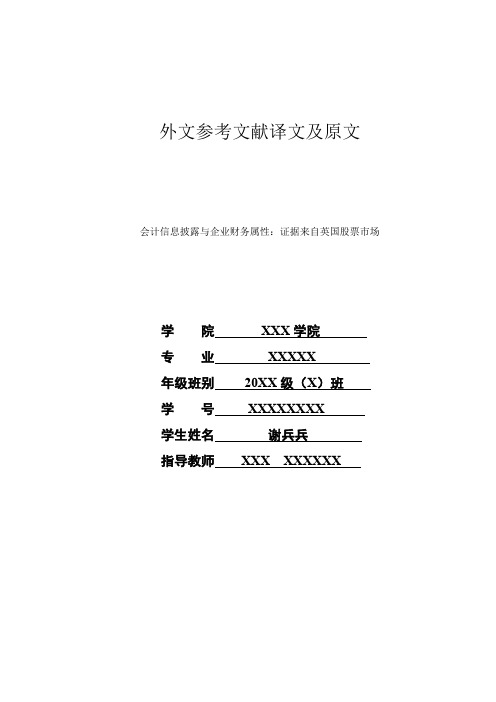
外文参考文献译文及原文会计信息披露与企业财务属性:证据来自英国股票市场学院XXX学院专业XXXXX年级班别20XX级(X)班学号XXXXXXXX学生姓名谢兵兵指导教师XXX XXXXXX2018年5月目录1 会计信息披露与企业财务属性:证据来自英国股票市场 (1)1.1 外文文献译文 (1)1.2 外文文献原文 (28)会计信息披露与企业财务属性:证据来自英国股票市场乔治·亚西里斯摘要本文重点介绍了英国企业财务报表的会计信息披露问题。
本次研究主要目的在于分析提供广泛会计信息披露的公司的财务特征,并评估其动机对财务的影响,例如需要筹集股权融资。
该研究调查了对于披露包含主要会计问题的会计信息的公司的财务特征,包括风险敞口、会计政策变化、国际财务报告标准的使用与对冲做法。
公司倾向于通过会计信息披露以确保市场参与者的会计政策与会计监管一致,并满足其利益相关者的信息需求。
研究表明,出于在资本市场和债务市场筹集资金的目的,企业往往会提供广泛的会计披露;并且提供信息性会计披露的公司似乎表现出更大的规模,更快的增长和和更强的杠杆措施。
调查结果还表明,敏感性会计信息的披露并未对公司的盈利能力产生不利影响。
事实上,提供详细会计披露的公司往往表现出较高的盈利能力。
国际财务报告准则的实施提高了财务报表的质量和可比性,同时也提高财务了报告的一致性和可靠性,有助于公司在国际市场筹集资金。
1 介绍会计政策的选择和激励因素会对会计信息披露质量和企业与会计信息使用者之间的沟通产生影响。
某些情况下,管理者通过影响所要报告的收益,来达到自身利益最大化目的,例如提高他们的声誉、加强股票回报与自身补偿计划(Fields, Lys, & Vincent, 2001; Hand & Skantz, 1998)。
同时,管理者也倾向于通过影响会计数字,以满足其财务义务,并遵守债权人设定的债务契约(Lambert, 2001)。
研发支出会计政策选择文献综述

研发支出会计政策选择文献综述研发支出在现代企业中扮演着至关重要的角色,它是企业持续发展和创新的核心驱动力之一。
在研发支出的会计政策选择方面,不同的企业可能会选择不同的方式来处理和报告研发支出,这涉及到其会计政策的选择。
本文将对研发支出会计政策选择的相关文献进行综述,从不同角度探讨研发支出会计政策选择的影响因素、优缺点以及国际会计准则对此的规定。
1. 研发支出会计政策选择的影响因素研发支出在企业中的重要性和复杂性决定了其会计政策选择受到多方面因素的影响。
从企业内部来看,企业的规模、行业特征、研发活动的强度和特点等都会影响其研发支出的会计政策选择。
外部环境因素如税收政策、监管要求、投资者需求等也会对研发支出会计政策选择产生影响。
研发支出的资本化、费用化以及其对企业绩效评价的影响也是企业在选择会计政策时需要考虑的因素。
研发支出的会计政策选择涉及到资本化和费用化两种不同的处理方式。
资本化能够在一定程度上提高企业的财务报表的质量,增加企业的资产和净利润,提升企业的财务健康状况,但也会增加企业的财务风险和财务杠杆。
相比之下,费用化能够降低企业的财务风险和负债水平,减少企业的财务成本,但也可能导致企业资产负债表的膨胀和财务报表的低质量。
企业在选择研发支出的会计政策时需要权衡其优缺点,根据自身情况做出合适的选择。
国际会计准则对研发支出的资本化和费用化提出了具体的规定。
根据国际会计准则,企业应当将研发支出资本化的前提是能够对其未来经济利益进行可靠的衡量,并且该研发项目是能够产生经济利益的。
如果不能满足这些条件,企业应当将研发支出费用化。
这些规定在一定程度上规范了企业在研发支出会计政策选择上的行为,保护了投资者的利益,提升了财务报表的透明度和质量。
研发支出在企业的会计政策选择中具有重要的意义,它关系到企业的财务报表质量、财务风险、绩效评价等方面。
企业在选择研发支出的会计政策时需要考虑企业内部和外部环境因素的影响,权衡资本化和费用化的优缺点,遵守国际会计准则的规定,以提升财务报表的透明度和质量,保障投资者的利益。
研发支出会计政策选择文献综述

研发支出会计政策选择文献综述研发支出是企业在技术创新和产品开发过程中的重要投入,对于企业的长期发展和竞争力提升起到至关重要的作用。
在会计准则的制定和选择过程中,如何处理研发支出的会计政策成为了各国企业和会计师的关注焦点。
本文将综述相关的文献,探讨研发支出会计政策的选择及对企业财务报表的影响。
1. 研发支出的会计政策选择研发支出的会计处理方式一直是国际会计准则委员会(IASB)和美国财务会计准则委员会(FASB)关注的重点之一。
根据国际会计准则(IAS)和美国通用会计准则(GAAP)的要求,企业可以采用资本化和费用化两种方式处理研发支出。
资本化是指将研发支出列入资产,通过折旧或摊销方式在未来期间分摊,而费用化则是将研发支出直接列入当期损益。
研发支出会计政策的选择对于企业的财务报表会产生重大影响,包括资产负债表的资产总额和负债总额、利润表的收入和费用等指标。
2. 研发支出会计政策的影响研究研发支出会计政策的选择对企业的财务报表会产生重大影响,因此学者们对此展开了深入的研究。
在研发支出资本化和费用化两种方式中,不同的会计政策选择会对企业的财务报表产生不同的影响。
研究表明,研发支出资本化可以增加企业的资产总额和利润表的利润水平,但也会增加负债总额和财务杠杆比率,降低企业的盈利能力和偿债能力。
而研发支出费用化则会减少企业的资产总额和利润表的利润水平,但会降低负债总额和财务风险,提高企业的盈利能力和偿债能力。
不同的会计政策选择会对企业的财务状况和经营绩效产生不同的影响。
3. 研发支出会计政策的国际比较不同国家和地区对于研发支出的会计政策选择存在着差异,这主要是由于不同国家和地区的会计准则和法规的不同。
欧洲和亚洲国家通常更倾向于采用研发支出资本化的会计政策,而美国则更倾向于采用研发支出费用化的会计政策。
这种差异主要源于不同国家和地区对于企业财务报表的使用和目的的不同,如欧洲和亚洲国家更注重企业的长期发展和价值创造,而美国更注重短期盈利能力和偿债能力。
研发支出对财务绩效的影响研究综述
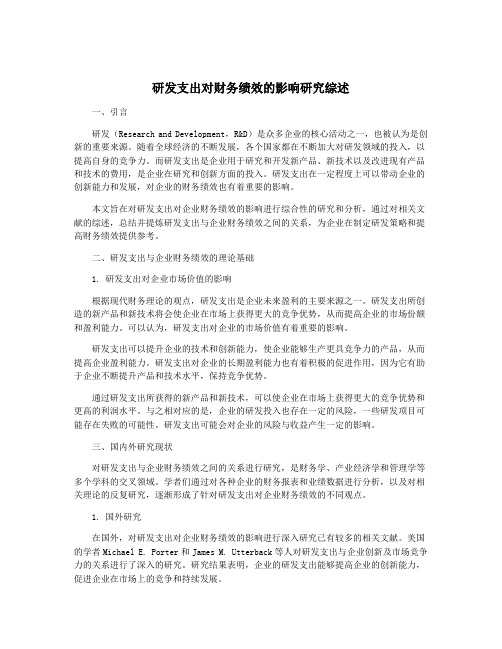
研发支出对财务绩效的影响研究综述一、引言研发(Research and Development,R&D)是众多企业的核心活动之一,也被认为是创新的重要来源。
随着全球经济的不断发展,各个国家都在不断加大对研发领域的投入,以提高自身的竞争力。
而研发支出是企业用于研究和开发新产品、新技术以及改进现有产品和技术的费用,是企业在研究和创新方面的投入。
研发支出在一定程度上可以带动企业的创新能力和发展,对企业的财务绩效也有着重要的影响。
本文旨在对研发支出对企业财务绩效的影响进行综合性的研究和分析,通过对相关文献的综述,总结并提炼研发支出与企业财务绩效之间的关系,为企业在制定研发策略和提高财务绩效提供参考。
二、研发支出与企业财务绩效的理论基础1. 研发支出对企业市场价值的影响根据现代财务理论的观点,研发支出是企业未来盈利的主要来源之一。
研发支出所创造的新产品和新技术将会使企业在市场上获得更大的竞争优势,从而提高企业的市场份额和盈利能力。
可以认为,研发支出对企业的市场价值有着重要的影响。
研发支出可以提升企业的技术和创新能力,使企业能够生产更具竞争力的产品,从而提高企业盈利能力。
研发支出对企业的长期盈利能力也有着积极的促进作用,因为它有助于企业不断提升产品和技术水平,保持竞争优势。
通过研发支出所获得的新产品和新技术,可以使企业在市场上获得更大的竞争优势和更高的利润水平。
与之相对应的是,企业的研发投入也存在一定的风险,一些研发项目可能存在失败的可能性。
研发支出可能会对企业的风险与收益产生一定的影响。
三、国内外研究现状对研发支出与企业财务绩效之间的关系进行研究,是财务学、产业经济学和管理学等多个学科的交叉领域。
学者们通过对各种企业的财务报表和业绩数据进行分析,以及对相关理论的反复研究,逐渐形成了针对研发支出对企业财务绩效的不同观点。
1. 国外研究在国外,对研发支出对企业财务绩效的影响进行深入研究已有较多的相关文献。
研发支出会计政策选择文献综述

研发支出会计政策选择文献综述研发支出在现代企业中扮演着至关重要的角色,它们直接关系到企业的创新能力和竞争力。
随着公司研发支出的持续增加,会计政策选择对公司的财务报告和决策产生了重要影响。
本文旨在对研发支出会计政策选择进行综述,探讨不同会计政策对企业财务报告的影响,以及企业在选择会计政策时所面临的问题和挑战。
研发支出的会计政策选择涉及到资本化和费用化两种方法。
资本化是指将研发支出视为资产,通过分期摊销的方式在一段时间内进行确认;而费用化则是将研发支出视为当期费用,在当期即列支并扣减利润。
对于资本化而言,其主要优势在于可以通过摊销的方式平摊研发支出对利润的冲击,从而更好地反映企业的长期效益;而费用化则可以降低财务报告的不确定性,使企业更加稳健。
早期的研究表明,资本化研发支出可以提高企业的盈余,但在现实中,由于资本化涉及到许多主观判断和假设,往往容易被管理层滥用,导致财务报告的真实性受到影响。
而费用化则可以减少管理层的自由裁量权,提高财务报告的可靠性。
费用化也会导致企业当前利润的下降,影响股东的利益。
在国际财务报告准则(IFRS)和美国通用会计准则(GAAP)中,对研发支出的会计政策有着不同的规定。
IFRS要求企业对研发支出进行资本化,但对资本化的具体要求有所放宽,使得企业可以更加自由地选择会计政策;而GAAP则要求企业对研发支出进行费用化,只有在符合特定条件的情况下才能资本化。
这种差异不仅影响了企业在不同国家的财务报告,也增加了企业的会计成本和财务风险。
对于企业而言,在面临不同的会计政策选择时,需要综合考虑财务报告的真实性、利润的稳定性、投资者的利益以及市场的反应等因素。
企业需要更加透明地披露其会计政策选择的原因和影响,并根据自身的情况选择最合适的会计政策。
监管机构和国际组织也需要进一步完善相关的规定,促进全球范围内的会计政策的一致性,降低企业的会计成本和风险。
在研究方面,未来还需要深入探讨不同会计政策对企业绩效评价的影响,以及在不同的行业和市场条件下,选择不同会计政策的合理性和影响程度。
研究开发支出会计处理对企业绩效的影响

研究开发支出会计处理对企业绩效的影响【摘要】在当今竞争激烈的市场环境下,企业研究开发支出的会计处理对企业绩效有着重要的影响。
本文首先介绍了研究开发支出会计处理的重要性和企业绩效的定义与影响因素。
接着分析了研究开发支出会计处理对企业绩效的直接影响、对企业创新能力、竞争力、市场地位以及财务表现的影响。
最后对研究开发支出会计处理对企业绩效的综合影响进行了总结,并提出了相应的管理建议。
未来研究方向包括进一步探讨研究开发支出会计处理与企业绩效之间的关系,并提出更加有效的管理策略。
通过本文的研究,有助于企业更好地理解和应对研究开发支出的会计处理对企业绩效的影响,从而提升企业的综合竞争力。
【关键词】研究开发支出、会计处理、企业绩效、创新能力、竞争力、市场地位、财务表现、管理建议、未来研究方向1. 引言1.1 研究开发支出会计处理的重要性研究开发支出会计处理的重要性在于其对企业绩效的影响至关重要。
研究开发支出是企业在提高产品和服务质量、创新和竞争力方面的重要投资。
而正确的会计处理可以更好地反映这些投资对企业绩效的实际影响。
通过准确记录和报告研发支出,企业能够更好地评估其创新能力和竞争力,并及时调整策略以提高绩效。
研究开发支出的会计处理也对企业的定价策略、财务决策和未来规划产生重要影响。
深入研究研发支出的会计处理对企业管理者做出正确决策,提高企业绩效,实现可持续发展至关重要。
通过对研发支出的会计处理进行系统分析和探讨,可以更好地发掘企业的潜力,提高经营效率,增强竞争优势,为企业长远发展打下坚实基础。
1.2 企业绩效的定义与影响因素企业绩效是指企业在实现其战略目标和使命的过程中所表现出来的绩效水平和绩效结果。
它是评价企业经营管理效果和实现目标程度的重要标准之一,也是衡量企业绩效优劣的主要指标。
企业绩效受到多种因素的影响,包括但不限于市场环境、管理层决策、员工素质和经济形势等。
市场环境是企业绩效的重要因素之一,不同的市场环境会对企业的经营状况和绩效产生不同程度的影响。
研发支出会计政策选择文献综述

研发支出会计政策选择文献综述研发支出是指企业为了开发新产品、新技术或者改进现有产品和技术而发生的支出,是企业未来长期发展的重要投入。
在会计上,研发支出的处理涉及到多个重要问题,如何界定研发支出、如何计量和核算研发支出、如何确定研发支出的资本化标准等。
本文旨在对研发支出会计政策选择的相关文献进行综述,以便了解不同的研发支出会计政策选择对企业经营绩效和财务报表的影响。
研发支出会计政策选择是指企业对研发支出进行会计处理时所采取的具体方法和标准。
由于研发支出的性质和特点与一般的生产成本有所不同,因此在会计上对研发支出的处理存在一定的复杂性和争议性。
研发支出的范围包括实验研究、应用研究、开发、试制等活动所发生的支出。
在会计上,研发支出的主要特点包括未来收益性和不确定性、周期性和长期性、固定成本和变动成本等。
研发支出的会计处理涉及到多个理论领域,包括会计标准、财务报告、成本会计、资本成本和投资决策等。
研发支出的会计处理与企业的长期发展战略和风险管理密切相关,需要兼顾企业内部和外部利益相关者的权益。
研发支出会计政策选择的影响因素主要包括法律法规、会计准则、市场竞争、投资者需求、企业文化和风险偏好等。
这些因素会对企业研发支出的资本化标准、披露要求和会计政策选择产生重要影响。
已有大量研究对不同的研发支出会计政策选择进行了实证研究,发现不同的会计政策选择对企业的财务报表和资本市场的影响存在较大差异。
研究表明,采用资本化研发支出的企业在资产负债表上的总资产和所有者权益将有所增加,同时会降低负债和杠杆比率;而采用费用化研发支出的企业在利润表上的利润总额和每股收益将有所提高,同时会降低资产周转率和资本回报率。
5. 研发支出会计政策选择的现状和发展趋势当前,随着科技创新和知识经济的发展,研发支出正逐渐成为企业竞争力的重要来源。
在会计上,越来越多的企业开始关注研发支出的会计处理,不同国家和地区的会计准则也在逐步调整研发支出的会计政策选择。
研发支出对财务绩效的影响研究综述

研发支出对财务绩效的影响研究综述1. 引言1.1 研发支出重要性的背景介绍研发支出作为企业的重要投入之一,在当前经济社会发展中扮演着至关重要的角色。
随着科技的不断进步和市场竞争的日益激烈,企业必须加大研发投入以确保产品和服务的创新,保持竞争力。
研发支出在企业财务绩效中起着关键作用,不仅可以提高企业的生产效率和产品质量,还可以带来新的盈利增长点。
研发支出不仅是企业的技术改进和创新的重要保障,更是企业未来发展的重要动力和竞争优势。
通过对研发支出的合理引导和管理,企业可以实现高效的研发投入,提高产品的竞争力和市场占有率,进而带动企业整体的财务绩效提升。
研究研发支出对财务绩效的影响,对于企业实现可持续发展和提升竞争力具有重要意义。
【2000字】1.2 研究目的和意义研究目的:本研究旨在探讨研发支出对企业财务绩效的影响机制,深入分析研发支出在提升企业财务绩效方面的作用和影响因素,为企业管理决策提供参考依据。
研究意义:研发支出作为企业在技术和创新方面的重要投入,对企业的发展和竞争力起着至关重要的作用。
通过研究研发支出对财务绩效的影响,可以帮助企业更好地规划和管理研发投入,提高企业的创新能力和竞争力。
本研究也有助于学术界对研发支出领域的理论和实证研究做出更深入的探讨,为相关领域的学术研究提供参考和借鉴。
本研究具有重要的理论和实践意义,对推动企业的可持续发展和经济增长具有积极的促进作用。
2. 正文2.1 研发支出对财务绩效的影响方式研发支出的直接影响是指通过提高企业的创新能力和技术水平,从而促进新产品的开发和市场推广,进而增加企业的收入和利润。
研发支出对财务绩效的直接影响体现在增加企业的销售额、市场份额和利润率等方面,通过提高产品质量和降低生产成本,从而提高企业的盈利能力。
研发支出的直接影响主要体现在企业的创新能力和市场竞争力的提升上,可以带动企业的财务绩效得到明显提升。
2.2 研发支出对企业财务绩效的影响因素研发支出对企业财务绩效的影响因素包括多个方面。
研发支出会计政策选择文献综述

研发支出会计政策选择文献综述研发支出是公司为了创新和发展而进行的重要投资活动,对于公司的未来发展至关重要。
对于研发支出的会计政策选择至关重要。
本文将综述相关文献,就研发支出会计政策选择进行探讨和分析。
1. 研发支出的会计政策选择研发支出的会计政策选择是指公司在进行研发支出会计确认、计量和资本化等方面的选择。
研发支出是公司为了开发新产品、提高产品质量、改善生产工艺等而发生的支出,其特点是长期性、高风险和高投入。
如何选择合适的会计政策对于公司的财务报告和财务决策具有重要影响。
2. 研发支出的会计政策选择的问题研发支出的会计政策选择面临一些问题,主要包括研发支出的确认时点、计量方法和资本化标准等。
在研发支出的确认时点上,公司可以选择在支出发生时立即确认,也可以选择在后续阶段逐步确认。
在研发支出的计量方法上,公司可以选择直接将支出作为费用列支,也可以选择分期摊销或者资本化处理。
在资本化标准上,公司可以选择严格的资本化标准或者相对宽松的资本化标准。
3. 相关文献综述关于研发支出的会计政策选择,国内外学者进行了大量的研究和探讨。
在研发支出的确认时点上,一些研究表明,及早确认研发支出可以更好地反映公司的价值创造活动,但也会增加盈余管理的可能性。
而在研发支出的计量方法上,一些研究认为,将研发支出直接列支作为费用可能会低估公司的价值,而选择资本化处理则可以更好地反映公司的潜在价值。
在资本化标准上,一些研究指出,严格的资本化标准可以降低盈余管理的可能性,但也可能导致公司丧失创新动力。
4. 研发支出的会计政策选择对公司的影响研发支出的会计政策选择对公司的财务报告和财务决策具有重要影响。
不同的会计政策选择会导致公司的财务报表呈现出不同的财务状况和经营业绩。
在公司的财务决策上,会计政策选择也会影响公司的投资、融资和分红等决策,进而影响公司的价值创造和股东利益。
5. 结论与展望研发支出是公司的重要投资活动,对于公司的未来发展至关重要。
研发支出影响因素文献综述

研发支出影响因素文献综述【摘要】本文通过对研发支出影响因素的文献综述,探讨了外部环境、内部组织、经济和管理等因素对研发支出的影响。
在研究背景和研究目的的基础上,详细解释了研发支出的定义和分类,以及各种因素对其的影响。
结合现有文献,提出了研发支出影响因素文献综述的启示,并展望未来研究的方向。
通过本文的总结,可以更全面地了解研发支出的影响因素,为企业的研发战略提供参考。
【关键词】研发支出、影响因素、外部环境、内部组织、经济、管理、文献综述、启示、展望、结论总结1. 引言1.1 研发支出影响因素文献综述的重要性研发支出是企业在创新和技术发展方面的重要投入,对企业的长期发展具有重要意义。
研发支出影响因素文献综述的重要性在于深入探讨了影响企业在研发方面投入的各种因素,可以为企业的决策提供有益参考。
通过对现有文献的综述和分析,可以帮助企业更好地理解研发支出决策的影响因素,从而指导企业未来的研发策略和规划。
研发支出影响因素文献综述还可以为学术界提供研究思路和方法,促进相关领域的学术交流与研究进展。
1.2 研究背景研发支出作为企业的重要投资之一,对企业的创新和竞争力具有重要影响。
随着科技进步和市场竞争的日益激烈,企业越来越重视研发活动,增加对研发支出的投入。
在实际运作中,企业在研发支出方面面临着诸多挑战和困难。
如何有效地管理和利用研发支出,成为企业管理者和研究者们关注的焦点。
在现代经济环境下,研发支出受到许多因素的影响,包括外部环境因素、内部组织因素、经济因素和管理因素等。
这些因素相互作用,共同影响着企业的研发活动和支出水平。
深入研究研发支出的影响因素,探讨各种因素对研发支出的影响机制和路径,对于指导企业科学决策、提高研发支出效益具有重要意义。
本文旨在对研发支出的影响因素进行综合梳理和分析,旨在为研究者和企业管理者提供理论参考和实践指导。
通过对研发支出影响因素的文献综述,我们可以更好地了解研发支出的特点和影响因素,探讨提升研发支出效益的策略和措施。
关于会计的英文文献原文(带中文翻译)
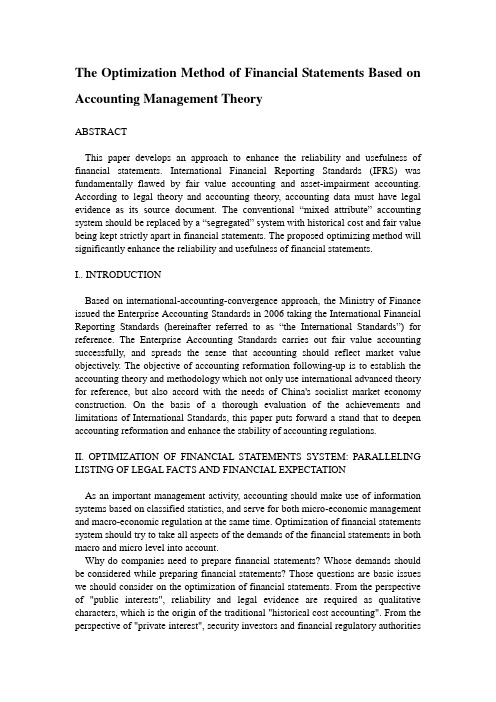
The Optimization Method of Financial Statements Based on Accounting Management TheoryABSTRACTThis paper develops an approach to enhance the reliability and usefulness of financial statements. International Financial Reporting Standards (IFRS) was fundamentally flawed by fair value accounting and asset-impairment accounting. According to legal theory and accounting theory, accounting data must have legal evidence as its source document. The conventional “mixed attribute” accounting system should be re placed by a “segregated” system with historical cost and fair value being kept strictly apart in financial statements. The proposed optimizing method will significantly enhance the reliability and usefulness of financial statements.I.. INTRODUCTIONBased on international-accounting-convergence approach, the Ministry of Finance issued the Enterprise Accounting Standards in 2006 taking the International Financial Reporting Standards (hereinafter referred to as “the International Standards”) for reference. The Enterprise Accounting Standards carries out fair value accounting successfully, and spreads the sense that accounting should reflect market value objectively. The objective of accounting reformation following-up is to establish the accounting theory and methodology which not only use international advanced theory for reference, but also accord with the needs of China's socialist market economy construction. On the basis of a thorough evaluation of the achievements and limitations of International Standards, this paper puts forward a stand that to deepen accounting reformation and enhance the stability of accounting regulations.II. OPTIMIZA TION OF FINANCIAL STATEMENTS SYSTEM: PARALLELING LISTING OF LEGAL FACTS AND FINANCIAL EXPECTA TIONAs an important management activity, accounting should make use of information systems based on classified statistics, and serve for both micro-economic management and macro-economic regulation at the same time. Optimization of financial statements system should try to take all aspects of the demands of the financial statements in both macro and micro level into account.Why do companies need to prepare financial statements? Whose demands should be considered while preparing financial statements? Those questions are basic issues we should consider on the optimization of financial statements. From the perspective of "public interests", reliability and legal evidence are required as qualitative characters, which is the origin of the traditional "historical cost accounting". From the perspective of "private interest", security investors and financial regulatory authoritieshope that financial statements reflect changes of market prices timely recording "objective" market conditions. This is the origin of "fair value accounting". Whether one set of financial statements can be compatible with these two different views and balance the public interest and private interest? To solve this problem, we design a new balance sheet and an income statement.From 1992 to 2006, a lot of new ideas and new perspectives are introduced into China's accounting practices from international accounting standards in a gradual manner during the accounting reform in China. These ideas and perspectives enriched the understanding of the financial statements in China. These achievements deserve our full assessment and should be fully affirmed. However, academia and standard-setters are also aware that International Standards are still in the process of developing .The purpose of proposing new formats of financial statements in this paper is to push forward the accounting reform into a deeper level on the basis of international convergence.III. THE PRACTICABILITY OF IMPROVING THE FINANCIAL STATEMENTS SYSTEMWhether the financial statements are able to maintain their stability? It is necessary to mobilize the initiatives of both supply-side and demand-side at the same time. We should consider whether financial statements could meet the demands of the macro-economic regulation and business administration, and whether they are popular with millions of accountants.Accountants are responsible for preparing financial statements and auditors are responsible for auditing. They will benefit from the implementation of the new financial statements.Firstly, for the accountants, under the isolated design of historical cost accounting and fair value accounting, their daily accounting practice is greatly simplified. Accounting process will not need assets impairment and fair value any longer. Accounting books will not record impairment and appreciation of assets any longer, for the historical cost accounting is comprehensively implemented. Fair value information will be recorded in accordance with assessment only at the balance sheet date and only in the annual financial statements. Historical cost accounting is more likely to be recognized by the tax authorities, which saves heavy workload of the tax adjustment. Accountants will not need to calculate the deferred income tax expense any longer, and the profit-after-tax in the solid line table is acknowledged by the Company Law, which solves the problem of determining the profit available for distribution.Accountants do not need to record the fair value information needed by security investors in the accounting books; instead, they only need to list the fair value information at the balance sheet date. In addition, because the data in the solid line table has legal credibility, so the legal risks of accountants can be well controlled. Secondly, the arbitrariness of the accounting process will be reduced, and the auditors’ review process will be greatly simplified. The independent auditors will not have to bear the considerable legal risk for the dotted-line table they audit, because the risk of fair value information has been prompted as "not supported by legalevidences". Accountants and auditors can quickly adapt to this financial statements system, without the need of training. In this way, they can save a lot of time to help companies to improve management efficiency. Surveys show that the above design of financial statements is popular with accountants and auditors. Since the workloads of accounting and auditing have been substantially reduced, therefore, the total expenses for auditing and evaluation will not exceed current level as well.In short, from the perspectives of both supply-side and demand-side, the improved financial statements are expected to enhance the usefulness of financial statements, without increase the burden of the supply-side.IV. CONCLUSIONS AND POLICY RECOMMENDATIONSThe current rule of mixed presentation of fair value data and historical cost data could be improved. The core concept of fair value is to make financial statements reflect the fair value of assets and liabilities, so that we can subtract the fair value of liabilities from assets to obtain the net fair value.However, the current International Standards do not implement this concept, but try to partly transform the historical cost accounting, which leads to mixed using of impairment accounting and fair value accounting. China's accounting academic research has followed up step by step since 1980s, and now has already introduced a mixed-attributes model into corporate financial statements.By distinguishing legal facts from financial expectations, we can balance public interests and private interests and can redesign the financial statements system with enhancing management efficiency and implementing higher-level laws as main objective. By presenting fair value and historical cost in one set of financial statements at the same time, the statements will not only meet the needs of keeping books according to domestic laws, but also meet the demand from financial regulatory authorities and security investorsWe hope that practitioners and theorists offer advices and suggestions on the problem of improving the financial statements to build a financial statements system which not only meets the domestic needs, but also converges with the International Standards.基于会计管理理论的财务报表的优化方法摘要本文提供了一个方法,以提高财务报表的可靠性和实用性。
研发支出会计政策选择文献综述
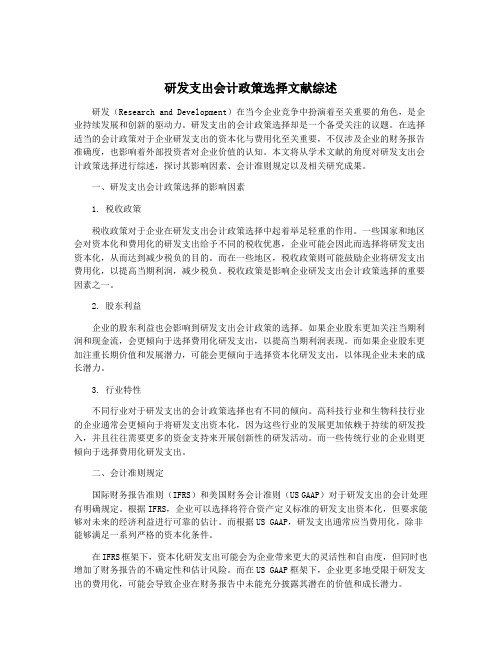
研发支出会计政策选择文献综述研发(Research and Development)在当今企业竞争中扮演着至关重要的角色,是企业持续发展和创新的驱动力。
研发支出的会计政策选择却是一个备受关注的议题。
在选择适当的会计政策对于企业研发支出的资本化与费用化至关重要,不仅涉及企业的财务报告准确度,也影响着外部投资者对企业价值的认知。
本文将从学术文献的角度对研发支出会计政策选择进行综述,探讨其影响因素、会计准则规定以及相关研究成果。
一、研发支出会计政策选择的影响因素1. 税收政策税收政策对于企业在研发支出会计政策选择中起着举足轻重的作用。
一些国家和地区会对资本化和费用化的研发支出给予不同的税收优惠,企业可能会因此而选择将研发支出资本化,从而达到减少税负的目的。
而在一些地区,税收政策则可能鼓励企业将研发支出费用化,以提高当期利润,减少税负。
税收政策是影响企业研发支出会计政策选择的重要因素之一。
2. 股东利益企业的股东利益也会影响到研发支出会计政策的选择。
如果企业股东更加关注当期利润和现金流,会更倾向于选择费用化研发支出,以提高当期利润表现。
而如果企业股东更加注重长期价值和发展潜力,可能会更倾向于选择资本化研发支出,以体现企业未来的成长潜力。
3. 行业特性不同行业对于研发支出的会计政策选择也有不同的倾向。
高科技行业和生物科技行业的企业通常会更倾向于将研发支出资本化,因为这些行业的发展更加依赖于持续的研发投入,并且往往需要更多的资金支持来开展创新性的研发活动。
而一些传统行业的企业则更倾向于选择费用化研发支出。
二、会计准则规定国际财务报告准则(IFRS)和美国财务会计准则(US GAAP)对于研发支出的会计处理有明确规定。
根据IFRS,企业可以选择将符合资产定义标准的研发支出资本化,但要求能够对未来的经济利益进行可靠的估计。
而根据US GAAP,研发支出通常应当费用化,除非能够满足一系列严格的资本化条件。
在IFRS框架下,资本化研发支出可能会为企业带来更大的灵活性和自由度,但同时也增加了财务报告的不确定性和估计风险。
- 1、下载文档前请自行甄别文档内容的完整性,平台不提供额外的编辑、内容补充、找答案等附加服务。
- 2、"仅部分预览"的文档,不可在线预览部分如存在完整性等问题,可反馈申请退款(可完整预览的文档不适用该条件!)。
- 3、如文档侵犯您的权益,请联系客服反馈,我们会尽快为您处理(人工客服工作时间:9:00-18:30)。
外文翻译The Determinants and Value Relevance of the Choice of Accounting for Research and Development Expenditures in the United Kingdom Material Source: London Business School Author:Dennis R. OswaldAbstractThis paper investigates the determinants and value relevance implications of the accounting method choice for development expenditures for firms with research and development (R&D) programs in the United Kingdom (UK). Using a sample of 1,780 UK firm-year observations over 1993-1997, of which I classify 231 (1,549) firm year observations as Capitalizers (Expensers), I find that the decision to expense versus capitalize is influenced by firm size, the intensity of the firm's R&D programs, and whether the firm is in a steady-state with respect to its R&D programs. Results of value relevance tests indicate that Expensers have little to gain, if anything, in terms of value relevance from adjusting their reported earnings and book value of equity to reflect as-if capitalized numbers. For the Capitalizers, the value relevance of as-if-expensed earnings and book value of equity is not substantially lower than the value relevance of their reported earnings and book value of equity Additional analysis indicates that the steady-state status and R&D intensity of a firm's R&D programs may marginally influence the value relevance of their financial information. These results are in contrast to those in US studies that find that capitalization of R&D expenditures greatly enhances the value relevance of firms' financial statements.Key Words: Research and Development, Accounting choice, Value relevanceIntroductionThis paper investigates the determinants and value relevance implications of the accounting method choice for development expenditures for firms with research and development (R&D) programs in the United Kingdom (UK). Under UK GAAP certain development expenditures may be either capitalized or expensed, with the choice left to the discretion of management. Using the reported disclosures of UK firms (including their capitalization and amortization schedules), I examine two questions related to the expensing versus capitalizing decision: (1) What factorsdistinguish expensing firms from capitalizing firms?; and (2) Conditional on the choice to expense or to capitalize, does the accounting treatment of development expenditures affect the value relevance of these firms’ financial statement information, as captured by the contemporaneous association between security prices and earnings and book value of equity?UK GAAP permits, but does not require, the capitalization and subsequent amortization of development expenditures if five conditions are met: (1) There is a clearly defined project; (2) The related expenditure is separately identifiable; (3) The outcome of the project is examined for its technical feasibility and its ultimate commercial viability considered in the light of factors such as likely market conditions (including competing products), public opinion, and consumer and environmental legislation; (4) The aggregate of deferred development costs, any further development costs, and related production, selling and administrative costs is reasonably expected to be exceeded by related future sales or other revenues; and (5) Adequate resources exist, or are reasonably expected to be available, to enable the project to be completed and to provide any consequential increases in working capital [Statement of Standard Accounting Practice (SSAP) No. 13, 1989]. Throughout this paper, I refer to development expenditures that meet conditions (1) - (5) as qualifying development expenditures. If conditions (1) - (5) are met, UK GAAP does not require capitalization - firms may choose to expense these costs in the period incurred. Thus, my investigations (of both management’s decision to select one accounting method over another and the possible valuation implications of that decision) assume that UK expensing firms meet the conditions to capitalize certain development expenditures and choose not to.My study is related to three areas of research. The first is research on the determinants of choices among generally accepted accounting rules. In particular, the first part of my analysis examines UK firms’elections to capitalize versus expense qualifying development expenditures. The second set of studies to which my paper contributes is research investigating whether and how the choice of accounting method influences the informativeness or value relevance of intangibles. Finally, is research on the value relevance of financial information when it is affected by the accounting treatment for R&D expenditures. My paper adds to the extant literature in two main ways. First, by focusing on the capitalization versus expensing decisions made by a sample of UK firms, I am able to examine the value relevance effects of actual (rather than hypothetical) capitalization and amortizationrules for qualifying development expenditures. Second my analysis of the value relevance of reported and adjusted accounting information for UK firms allows me to explore the association between measures of firm value and financial statement information conditional on a firm’s choice of one accounting treatment over another.My first set of tests examines factors that I hypothesize influence the choice of accounting for development expenditures. Based on prior research, I posit that both an industry-specific factor (product life cycle) and firm-specific factors (profitability, leverage, R&D intensity, R&D steady-state, systematic risk and firm size) influence this choice. Using a sample of 1,780 UK firm-year observations over 1993-1997, of which I classify 231 (1,549) firm-year observations as Capitalizers (Expensers)2, I find that the decision to expense versus capitalize qualifying development expenditures is influenced by firm size (smaller firms are more likely to capitalize), the intensity of the firm's R&D programs (firms with greater R&D intensity are more likely to capitalize), and whether the firm is in a steady-state with respect to its R&D programs (firms not in steady-state are more likely to capitalize).My second set of tests compare the value relevance of both reported earnings and book values of equity versus adjusted values of these variables (where the adjustments restate the reported financial information to the alternative accounting method3). The results indicate that Expensers have little to gain, if anything, in terms of value relevance from adjusting their reported numbers to reflect as-if-capitalized numbers. For the Capitalizers, the value relevance of as-if-expensed earnings and book value of equity is not substantially lower than the value relevance of the reported financial data; the magnitude of any difference in explained variability is small. Additional analyses examine the influence of firms' steady-state status and level of R&D intensity on the value relevance of their earnings and book value of equity. The results indicate that steady-state status and R&D intensity may play a minor role in influencing the value relevance of earnings and book value of equity of firms with R&D programs. Specifically, the explained variation is generally significantly higher under a policy of capitalizing versus a policy of expensing, with the difference being larger for firms either not in steady-state or with high R&D intensity; however the magnitude of the difference remains small.The rest of the paper is organized as follows. The related literature and motivation for this study are provided in section 2. Section 3 develops the hypotheses and research design. The sample and data requirements are discussed in section 4. Section 5 presents the analysis of the determinants of the expense versuscapitalization decision, and Section 6 reports results on the value relevance of earnings and book value of equity under each accounting method. Section 7 summarizes the results and concludes.VII. Summary and ConclusionUsing the reported disclosures relating to development expenditures of 1,780 UK firm-year observations over 1993-1997, I investigate two specific questions relating to the capitalize versus expense decision: (1) What factors distinguish expensing firms from capitalizing firms?; and (2) Conditional on the choice to expense or to capitalize, does the accounting treatment of development expenditures affect the value relevance of these firms' earnings and book value of equity?My first set of tests examines factors that I hypothesize influence the choice of accounting for qualifying development expenditures. Specifically, I use a log it regression of the decision to expense qualifying development expenditures on industry indicator variables (to proxy for product life cycle), profitability, leverage, systematic risk, firm size, R&D intensity and R&D steady-state. The results indicate that larger firms, firms in steady-state and firms with lower R&D intensity are more likely to expense their qualifying development expenditures.My second set of tests compares the value relevance of reported earnings and book value of equity to the value relevance of the adjusted values of these variables (where the adjustments restate earnings and book value of equity to the alternative accounting method). The results conditional on the choice of accounting method for qualifying development expenditures are mixed regarding which method generates the higher value relevant earnings and book value of equity. Specifically, in some instances, adjusted (reported) financial data explain significantly more of the variation in share prices than do reported (adjusted) financial data for the Expensers (Capitalizers); however, the difference in adjusted R2 is small in magnitude. The results of the other tests (i.e., the variance of the log of the ratio of predicted share price to observed share price and the explained variability from the price and return regressions on the R&D components) indicate no difference in value relevance between using reported and adjusted numbers. Finally, the results of additional analyses that examine the influence of steady-state status and R&D intensity of firms' R&D programs are also mixed. In some cases there is limited evidence that for firms not in steady-state or with high R&D intensity the value relevance of their earnings and book value of equity is higher using numbers based on a policy of capitalization versus expensing.译文英国的研发支出对于会计选择的影响因素和价值相关性资料来源: London Business School 作者:Dennis R. Oswald摘要本文探讨了英国的研究与开发支出(R&D)对于公司会计选择的影响因素和价值相关性。
